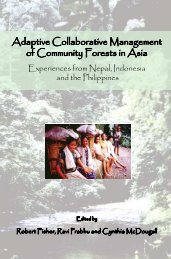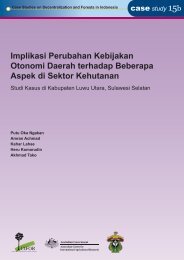A review of dipterocarps - Center for International Forestry Research
A review of dipterocarps - Center for International Forestry Research
A review of dipterocarps - Center for International Forestry Research
You also want an ePaper? Increase the reach of your titles
YUMPU automatically turns print PDFs into web optimized ePapers that Google loves.
Root Symbiosis and Nutrition<br />
concentrated on surveys and the effectiveness <strong>of</strong><br />
ectomycorrhizas in promoting growth <strong>of</strong> seedlings under<br />
adverse conditions. Presently dipterocarp mycorrhizal<br />
research is not very active and progress has been slow<br />
due to the limited number <strong>of</strong> researchers and funds<br />
available (Sangwanit 1993).<br />
Philippines<br />
Work on dipterocarp mycorrhizas in the Philippines<br />
started about five years ago at the University <strong>of</strong> Los<br />
Baños, Laguna (de la Cruz 1993) with attempts to<br />
combine <strong>dipterocarps</strong> propagated by cuttings/tissue<br />
culture and mycorrhizal inoculation. Results will be<br />
reported in a <strong>for</strong>thcoming publication (de la Cruz in<br />
press). Considerable research has been focused on the<br />
development <strong>of</strong> mycorrhizal inoculum delivery systems,<br />
mainly <strong>for</strong> use with pines and eucalypts. Some <strong>of</strong> these<br />
systems may be effective <strong>for</strong> <strong>dipterocarps</strong> but tests need<br />
to be carried out, especially under field conditions.<br />
Recently a survey <strong>of</strong> ectomycorrhizal fungi associated<br />
with pines and <strong>dipterocarps</strong> was undertaken with funding<br />
from the EEC (Zarate et al. 1993).<br />
Other Groups<br />
Some preliminary research on dipterocarp mycorrhizas<br />
has also been carried out in Sri Lanka (Abeynayake 1991).<br />
However, such work is not given much emphasis as<br />
re<strong>for</strong>estation <strong>of</strong> degraded lands with <strong>dipterocarps</strong> has not<br />
been successful and Sri Lanka is presently not using<br />
<strong>dipterocarps</strong> <strong>for</strong> re<strong>for</strong>estation on a large scale<br />
(Abeynayake 1991). In India some research was<br />
conducted on ectomycorrhizal fungi associated with<br />
Shorea robusta in the early 1970s (Bakshi 1974) but<br />
since then there have been no new reports <strong>of</strong> mycorrhizal<br />
research on <strong>dipterocarps</strong>.<br />
Mycorrhiza Network Asia<br />
Mycorrhiza Network Asia was established at the Tata<br />
Energy <strong>Research</strong> Institute, New Delhi on 1 April 1988.<br />
This network serves as a point <strong>of</strong> reference <strong>for</strong><br />
mycorrhizal scientists in Asia and provides various<br />
services such as literature searches, a directory <strong>of</strong> Asian<br />
mycorrhizal researchers, a germplasm bank, organisation<br />
<strong>of</strong> meetings and symposia, and the publication <strong>of</strong> a<br />
quarterly newsletter, Mycorrhiza News. Mycorrhizal<br />
researchers from the various Southeast Asian countries<br />
are members or are aware <strong>of</strong> the existence <strong>of</strong> this network<br />
109<br />
and meet from time to time at the Asian Conference on<br />
Mycorrhizae (ACOM); the Third ACOM was held in<br />
Indonesia in April 1994. Previous meetings were held in<br />
India (1st ACOM) and Thailand (2nd ACOM).<br />
However, rapid progress on dipterocarp mycorrhizal<br />
research in the Southeast Asian region is constrained by<br />
several factors:<br />
1. Insufficient numbers <strong>of</strong> suitably trained and active<br />
mycorrhizal researchers in most Southeast Asian<br />
countries. For example, there are only two scientists<br />
actively working on dipterocarp mycorrhizas in<br />
Malaysia and Thailand respectively.<br />
BIOTROP has conducted several training courses on<br />
mycorrhizas <strong>for</strong> participants from the ASEAN<br />
countries but it is un<strong>for</strong>tunate that most trainees do<br />
not engage in mycorrhizal research upon returning<br />
to their own countries. A slightly different problem<br />
is encountered in the Philippines where many trained<br />
researchers leave the country <strong>for</strong> better opportunities<br />
abroad. In Indonesia an encouraging situation has<br />
recently developed where practising <strong>for</strong>esters were<br />
sent by their employers, the various concession<br />
holders, to attend a two-week local training course<br />
on mycorrhizal techniques conducted by BIOTROP.<br />
2. Insufficient budget to undertake such research.<br />
Most local governments do not allocate sufficient<br />
funds <strong>for</strong> basic research including mycorrhizal<br />
research. De la Cruz (1993) pointed out that much<br />
<strong>of</strong> the productive mycorrhizal research came from<br />
external grants.<br />
3. Lack <strong>of</strong> regional collaboration.<br />
Much has been spoken about the need <strong>for</strong> regional<br />
research collaboration in many fields, including<br />
mycorrhizal research, but to date no concrete<br />
proposals have materialised <strong>for</strong> regional mycorrhizal<br />
research.<br />
4. Lack <strong>of</strong> expertise in some fields <strong>of</strong> mycorrhizal<br />
research, such as identification <strong>of</strong> ectomycorrhizal<br />
fungal associates, culture and propagation <strong>of</strong><br />
mycorrhizal inoculum.<br />
A local or regional flora <strong>of</strong> potential ectomycorrhizal<br />
fungi is needed as baseline in<strong>for</strong>mation <strong>for</strong> many<br />
studies. A start has been made in several Southeast<br />
Asian countries to collect and collate such<br />
in<strong>for</strong>mation. However, most <strong>of</strong> the research is only<br />
possible because <strong>of</strong> the collaboration <strong>of</strong> <strong>for</strong>eign<br />
experts working on short-term projects.

















